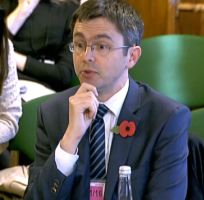The apprenticeships and skills minister is “pretty sure” that no apprentices will get to the end of their course without an end-point assessment organisation in place.
Robert Halfon was grilled on the topic in speaking at a sub-committee on education, skills and the economy evidence session on apprenticeships today (November 2) in the Palace of Westminster, by co-chairs Neil Carmichael and Iain Wright, and Ian Mearns, MP for Gateshead.
While the government claims 60 per cent of standards have assessment organisations, many of these standards have no learners.
As previously reported in FE Week, of those standards with learners, 59% (33) have no assessment org and 42% (1,790) of apprentices are on the 33 standards with no assessment organisation.
Speaking to the sub-committee, Mr Halfon said: “Even where there isn’t an assessment organisation yet, we’re pretty sure that by the time they’ve finished their apprenticeship, which could be on year, two years, they will have the assessment organisation in place.
“Huge amounts of resources are being put in in terms of working with the providers; a lot of work is going on with the employers to make sure of that.”
He added: “I don’t think the picture is quite as bleak as it’s been painted in some areas.”
Mr Halfon’s words followed similar comments made yesterday by Peter Lauener, interim chief executive of the new Institute for Apprenticeships, and chief executive of the Skills Funding Agency and Education Funding Agency.
Mr Lauener told a packed audience at the Association of Employment and Learning Providers Autumn conference in Manchester that having no approved awarding organisations for over 40 per cent of learner starts on new standards is “not ideal” but the situation was “manageable”.
He added that he did not think “there’s a consensus” view that the situation was a serious problem or that apprentices should not start their courses without an end-point assessor in place.
However, when AELP chief executive Mark Dawe took a poll of the audience, not a single hand went up to say it was acceptable for an apprentice to be studying on a course that had no end-point assessment organisation assigned to it.
In today’s debate Mr Halfon told the sub-committee that “60 per cent of standards have an assessment organisation in place” and “that figure goes up from 60 per cent to 94 per cent if you include assessment organisations either about to be registered or within 12 months of the gateway of the end of the apprenticeship”.
 David Hill, director of apprenticeships at the Department for Education (pictured right), who accompanied Mr Halfon at the evidence hearing, added: “Looking specifically at apprentices expected to be ready for their end-point assessment in the next 12 months, our analysis is that of those 1737 (86 per cent) already have at least one end-point assessment organisation ready for selection.
David Hill, director of apprenticeships at the Department for Education (pictured right), who accompanied Mr Halfon at the evidence hearing, added: “Looking specifically at apprentices expected to be ready for their end-point assessment in the next 12 months, our analysis is that of those 1737 (86 per cent) already have at least one end-point assessment organisation ready for selection.
“That leaves another 278 apprentices and we’ve gone through exactly the status of those apprentices on different standards”.
He highlighted that for three apprenticeship standards, covering 40 apprentices, “we have organisations very, very close to being approved and we’re working with those organisations to get them on the register”.
Mr Hill concluded: “We’ve looked hard at this we are confident that we have a plan in place to make sure that there will be full coverage.”
In an FE Week article on October 14, Dr Sue Pember, who stood down as the civil service head of further education and skills investment in February 2013, said it is “diabolical to let an apprentice start a programme, without explaining not only what the end test will contain, but where it will be, what shape it will take and who will be the organisation to oversee and manage the process”.
Mr Dawe, also commented on the topic in an FE Week expert piece, when he wrote: “Having appropriate standards and robust EPAs are vital to the success of the apprenticeship programme and the development of skills in the UK.
“However feedback from AELP members suggests that while there are some excellent ones, this isn’t true for every standard developed and the damage that could be done to apprenticeships is far worse than the concerns around funding changes which we have had over the past weeks.”








Pointed questions put and answered – after a fashion, but considering the gathered resources and time taken, very little was said and even less learned by me. Oh and the minister repeatedly said that the ‘the world is changing. Quite right Mr Halfon but I guess that you like so many others assume that the vast majority of the FE & Skills sector ‘manage’ their apprenticeships more efficiently than they did at the turn of the century. Check it out before the employers do.